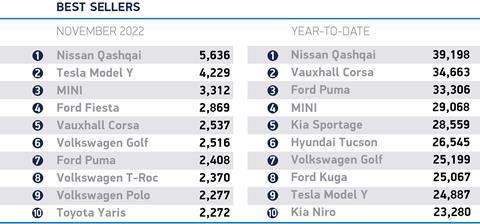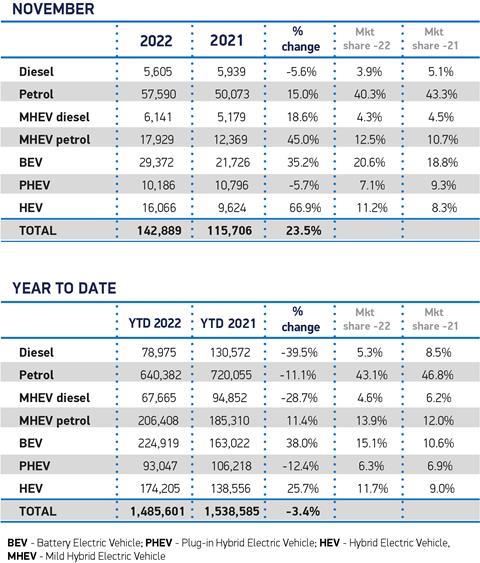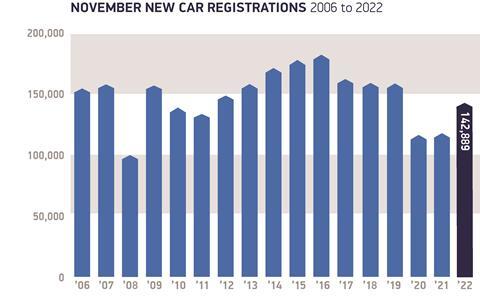- Britain’s new car market grows for fourth month running, up by 23.5% in November, at 142,889 units.
- Plug-ins account for more than one in four (27.7%) new registrations as battery electric vehicles (BEVs) take their largest monthly share of the new car market in 2022.
- SMMT calls for urgent government action to deliver charging infrastructure and support EV uptake to deliver UK’s ambitious net zero targets.

Company car sales helped boost new registrations, while zero emission vehicle uptake continued to grow last month, according to the latest registration figures released by the Society of Motor Manufacturers and Traders (SMMT).
However, Barclays Bank reported growing consternation and a ‘milder’ appetite for electric vehicles, with some cancelled orders, and people more likely to hedge their bets and buy hybrids.
The SMMT reported that the UK new car market grew 23.5% in November to 142,889 registered units, in the fourth consecutive month of year-on-year growth, which delivered the best total for November since 2019, with manufacturers continuing efforts to fulfil orders amid erratic global components supply.
However, registrations in the month were still -8.8% below 2019 levels and, while further recovery is anticipated in 2023, global and domestic economic challenges mean that the market will remain below pre-pandemic levels.
Registrations by large fleets energised the market, up 45.4% compared with November last year. Demand from private buyers also grew, albeit by a more modest 2.7%. Business registrations more than doubled, meanwhile, up 112.2%, but remain a small fraction of the overall market.
Zero emission vehicle uptake continues to grow, with newly registered battery electric vehicles (BEVs) up 35.2% to represent more than one in five new cars (20.6%) – the largest monthly share of BEVs this year. Conversely, plug-in hybrid (PHEVs) registrations fell by -5.7%, making up 7.1% of the market. As a result, some 39,558 new plug-ins were registered, representing more than one in four (27.7%) new cars joining UK roads in November. Hybrid electric vehicles (HEVs), meanwhile, rose by 66.9% to 11.2% of the market, driven particularly by fleet operators looking for flexibility and emissions reductions.
The most in-demand supermini and lower medium vehicle segments both grew by 21.5% and 20.5% respectively in November, while dual purpose vehicles increased by 21.8%. There was significant growth in luxury saloon and multi-purpose vehicles, up 87.3% and 288.6%, but these segments still remain a small section of the market.
The SMMT reported that as growth returns to the new car market, the car sector is poised to deliver an additional £8 billion for the UK economy in 2023, with an anticipated 15.4% market growth. It says UK automotive is making rapid strides to deliver on its net-zero targets, and further acceleration requires forward-thinking planning and collaboration from all stakeholders.
Mike Hawes, SMMT chief executive, said: “Recovery for Britain’s new car market is back within our grasp, energised by electrified vehicles and the sector’s resilience in the face of supply and economic challenges. As the sector looks to ensure that growth is sustainable for the long term, urgent measures are required – not least a fair approach to driving EV adoption that recognises these vehicles remain more expensive, and measures to compel investment in a charging network that is built ahead of need. By doing so we can encourage consumer appetite across the country and accelerate the UK’s journey to net zero.”
He stressed that measures that boost motorists’ confidence in EVs, including a fiscal framework that encourages EV adoption and targets to speed up the provision of charging infrastructure, will help to ensure uptake is in line with the UK’s green goals, particularly as the ambitious Zero Emission Vehicle Mandate comes into effect.
Referring to today’s SMMT new car registration figures, Karen Johnson, head of Retail & Wholesale at Barclays Corporate Banking, said: “Electric vehicles have been something of a success story for motor dealers over recent months, as they provided a motivation for consumers to ‘buy new’ even in the face of growing demand for ‘used’, and November has seen sales of pure electric vehicle continue this positive trend.
“However, dealers across the market have concerns for the future with many reporting growing consternation among consumers. Reduced incentives, increased electricity costs and concerns about infrastructure are all contributing to a milder appetite for electric vehicles, with some previously confirmed orders even being cancelled in recent weeks. There is still clear demand for greener options, but going forward consumers look more likely to hedge their bets and buy hybrids. How long this lasts will be a key question for 2023.”
Jon Lawes, Managing Director, Novuna Vehicle Solutions, said: “It is encouraging to see that the new car market is still expanding, with battery electric vehicles (BEVs) capturing their largest monthly share of the new car market in 2022 last month.
“However, supply chain issues are now one of the most significant barriers to EV adoption. We’re seeing fewer than half the number of cars rolling off production lines than we did 5 years ago, owing primarily to ongoing issues obtaining computer chips for vehicles, which could severely dampen EV adoption in the coming months.
“While companies such as ours have taken steps to meet demand, such as purchasing vehicles up to 15 months in advance to ensure customers can get into new vehicles as soon as possible and extending lease agreements for those willing to wait, it’s clear that this isn’t the solution. To reduce these vulnerabilities and provide confidence to the sector, the government should consider developing a robust semiconductor industry in the UK.”
Kim Royds, EV Director at British Gas, said: “Despite ongoing supply chain challenges, the accelerated growth of electric vehicles continues to dominate the new car market – reaffirming the appetite among drivers to transition away from traditional petrol or diesel vehicles.
“However, there is still a great deal of work to be done to futureproof the UK’s charging network to meet the increased demand and ensure all motorists have access to reliable and convenient charge points. Providing compelling and easy options for home charging is a vital part of this and will help to stimulate further growth across the EV market.”



































No comments yet